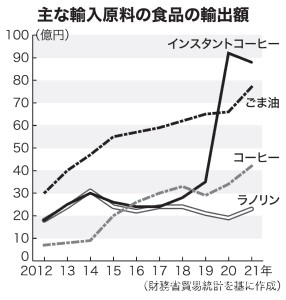Japan’s exports of processed foods made from imported farm produce soar, raising doubts over contribution of exports to domestic agriculture
TOKYO, Jan. 9 — Japan’s exports of processed foods made from ingredients imported from overseas have been increasing rapidly.
Export value figures in the last decade show that shipments rose particularly for coffee beans, increasing six times over the period, and instant coffee, up five times.
Such items are categorized as Japan-made agricultural and food products when they are exported, which means it is becoming more difficult to determine to what extent exports are contributing to boosting Japan’s agriculture.
It is urgently needed to grasp the situation of exports of foods that use ingredients shipped from abroad.
The Japanese government has set a goal of raising the country’s exports of agricultural and food products to 2 trillion yen by 2025.
However, such exports include not only farm and livestock products such as rice, vegetables, fruits and meat, but also large amounts of other food items — mineral water, supplements and products made from imported ingredients.
According to the Finance Ministry’s trade statistics, Japan exported record high 4.2 billion yen of coffee beans in 2021, up 24 percent from the previous year. The exports soared six times from a decade ago.
Exports of instant coffee totaled 8.8 billion yen, up 4 percent from a year before and increasing five times from 10 years ago. All Japan Coffee Association says most coffee products used in Japan, except for very few products, are imported.
A similar trend can be seen for sesame oil. Exports of sesame oil posted a fresh record high of 7.7 billion yen in 2021, rising 17 percent from a year before.
The exports topped 10,000 tons in terms of volume, but this is far from the realities of domestic sesame production.
According to Japan Speciality Agriculture Products Association, production of sesame used to extract oil totaled 40 tons in 2020. Assuming that 20 percent of the sesame seed weight is turned into oil, domestic production of sesame oil is estimated to be only about eight tons, largely less than the amount exported from Japan.
Lanolin, produced by refining wool grease that covers sheep wool fiber for use in cosmetics and other purposes, is also included in exports of food products.
Japan exported 2.3 billion yen of lanolin in 2021, up 21 percent from the previous year, roughly the same value as shipments of domestically-produced pork.
But in reality, an Osaka-based firm engaging in business related to lanolin says it has never heard of the product being produced in Japan.
Moreover, there are unidentifiable food items categorized as “other items of other prepared foods” in export statistics, indicating that as much as 20 percent of agricultural and food exports are not directly related to boosting domestic production.
The government should closely examine the situation of such food exports and send out information that is easy to understand, as well as taking measures to promote exports that are beneficial to producing regions within the country.
Source: http://english.agrinews.co.jp/?p=10375

